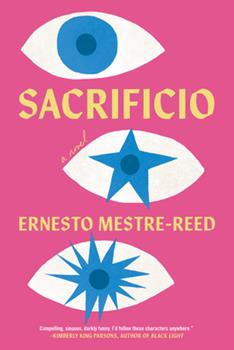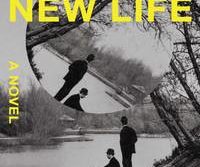IN ERNESTO MESTRE-REED’S novel Sacrificio, Rafa is a penniless Afro-Cuban teenager from the rural eastern part of the country who travels to the fishing village of Cojímar, famous as the setting for Hemingway’s novel The Old Man and the Sea. Rafa is cruised and picked up by Nicolás, then taken to Havana to become a waiter in the semi-legal restaurant run by Nicolás’ family. Welcomed as another son by Nicolás’ strong-willed mother Cecilia, the family struggles to make do while catering to the dwindling number of “Yuma,” foreign tourists.
Havana itself is on edge. It is the late 1990s, and Cuba’s main source of assistance, the Soviet Union, has collapsed, sending the nation’s economy into a tailspin. Nonlethal bombs aimed at popular tourist locations are going off throughout the city, followed by mysterious graffiti that seems to pop up everywhere. All this occurs as Pope John Paul II is scheduled to make a historic visit to the country.
Nicolás and his younger brother Renato appear to be slackers, with no interest in helping in the family restaurant or anything else beyond the pursuit of casual pickups, “perfecting the art of la nada, their little charade against revolutionary society,” according to Cecilia. Diagnosed as HIV-positive, Nicolás is sent to one of Cuba’s AIDS sanitariums, where the government has controversially quarantined those with the illness. After Nicolás’ death, Rafa grows closer to Renato, who is also gay and positive.
When Renato disappears from the sanitarium, Rafa and Steffan, a German tourist that he and Renato picked up (who may be a spy for the Cuban government) go searching for him. Together they encounter “Los Injected Ones,” a band of counterrevolutionaries who plan to topple the government and scare away tourists by injecting themselves and others with HIV-positive blood: “It had been happening on the Island almost from the day the first sanitarium opened, he said, with so many of the young men, almost never women, injecting themselves with infected blood, because it was an act of rebellion, because they wanted to get some of the conveniences offered in the sidatorio [AIDS clinic] that were so lacking on the rest of the Island.”
Living in a phantasmagorical city built with the detritus of Havana on the roofs of abandoned buildings, the group proves to be responsible for the bombings and “Sacrificio” graffiti. They bring Rafa and Steffan into their elaborate plan for a major action during the Pope’s visit.
Author of two other novels set in Cuba, Ernesto Mestre-Reed was born in Guantánamo and teaches at Brooklyn College. He has written Sacrificio in English with some untranslated Spanish that’s easy to understand in context. With its frequent use of flashbacks and a stream-of-consciousness ending, the result is kaleidoscopic, mixing a coming-of-age story with elements of a spy novel and mordant political commentary. Offering an evocative portrait of the difficulties of life for the average Cuban during the “Special Period,” Sacrificio is a dizzying, captivating reading experience.
Reginald Harris is the author of Ten Tongues and Autogeography.





